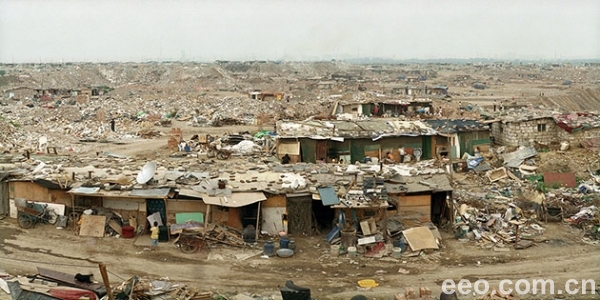

By Liu Jinsong
Nation, page 12, Issue No.527, July 11, 2011
Translated by Zhu Na
Original article: [Chinese]
As Beijing grows, so its garbage spreads. The city has surrounded itself with rings of rubbish – first there was one just beyond the fourth ring road, now there's another one beyond the sixth ring road.
“If you take a walk around these unofficial dumps, you realize that it’s a lucrative business,” says Wang Jiuliang, a photographer who recently exhibited images from his visits to 400 dumps outside the city.

At one dump three kilometers south of Beijing’s sixth ring, Wang found men and women sorting through the clothes, metal and plastics, picking out anything that could be recycled.
The village leased out the 300-acre space two years ago. It was rented out by businessmen, who dug a six-meter deep pit. It’s not regulated by the Beijing authorities. The pit is now almost full of garbage and has a row of hovels where the rubbish sorters live.
Another dump, hidden behind some trees two kilometers to the west, accepts sewage as well as waste from households and construction sites. The drivers of garbage trucks pay as much as a hundred yuan to tip their trash into the pits. There are special zones of the pit for waste, such as wood, foam and metal, that can be recycled.
Unwelcome photographer
Most of the dumps photographed by Wang were guarded, and he was often chased away by dogs and men with knives. In Chaoyang District, he was even mobbed by dozens of young men who threatened him to break his digital camera and wouldn’t release him until he deleted the photographs.
After the exhibition of his work, Wang revisited many of the sites and said that around half of them had been emptied.
Wang Weiping, an expert on garbage disposal who advises the Beijing government said that the city’s garbage problem was at its worst in the 1980s, when aerial photographs showed that there were more than 4,700 garbage dumps around the circle of the 4th ring road.
Valuable junk
It’s much cheaper to tip garage into unofficial dumps that the official ones, which have to comply with leakage and pollution checks. The dump operators make their profits from recycling the most useful trash, not from the payments made by truck drivers.
The operators' fees vary according to the contents of the garbage. “If there is lots of good stuff that can be recycled, they don’t charge you any dumping fee,” says Wang, adding that if the rubbish from one truck looks really valuable the operators will offer to pay the drivers.
Rubbish from the elite residential blocks, in districts like Liuli Tun, the embassy area and pub streets, is particularly sought after – contractors take it straight to the illegal dumps.
Media reports show Beijing’s unofficial garbage have been operating like this since 2007.
Kitchen waste is the most profitable ones, so they are favored by rubbish collectors.
Although the rubbish classification hasn’t been done by residents at the very beginning, all the garbage actually has already been sorted many times by rubbish pickers before it arrived the rubbish clearing station.
A kilo a day
According to Wang Weiping, Beijing produced 6.5 million tons of garbage in 2010, equivalent to slightly less than a kilogram per person each day. Around 4 million tons were sorted and recycled. After picking through the rubbish all day, each evening rubbish pickers send their selections to trading places near 5th ring road – whatever is rejected goes into new rubbish piles.
Wang says that Beijing really needs to focus on reducing its garbage output. He cites Japan as an example - Tokyo’s garbage reached its peak in 1989 and has been falling ever since – it’s now around half of its 1989 level and many of the city’s incinerators have shut down.
Beijing's draft bill on Domestic Garbage Regulations, which was submitted to the city's National People’s Congress this May suggested charging people for their domestic waste. That might be a step towards solving the problem.
Links and sources
Guardian Photographer zooms in on Beijing\'s waste
Beijing to sweeten stench of rubbish crisis with giant deodorant guns